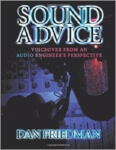Got eyes, a few bucks, and a way to read e-books? Good! Educate yourself!
1. There’s Money Where Your Mouth Is by Elaine A Clarke
 The Bible according to Elaine. This book is one I come back to every year or so because it’s just that damn good. It’s your trusty all-in-one handbook on the world of voiceover. It’s great coming back to see what information I’ve actually digested and what behaviors I’ve developed as a result. How to breathe, how to interpret copy, how to identify and fix everything wrong about your delivery and how you use a mic; the differences between stage and studio acting; breakdowns of every type and style of VO and how to do them. If you’re just getting into VO, or need a guiding light once in a while, get this book immediately. I cannot recommend it enough.
The Bible according to Elaine. This book is one I come back to every year or so because it’s just that damn good. It’s your trusty all-in-one handbook on the world of voiceover. It’s great coming back to see what information I’ve actually digested and what behaviors I’ve developed as a result. How to breathe, how to interpret copy, how to identify and fix everything wrong about your delivery and how you use a mic; the differences between stage and studio acting; breakdowns of every type and style of VO and how to do them. If you’re just getting into VO, or need a guiding light once in a while, get this book immediately. I cannot recommend it enough.
2. How to Build a Six-Figure Voice Over Business by BIll DeWees

Bill is a fantastic wellspring of information. Look him up on YouTube and you’ll see a treasure trove of tidbits that lead to real breakthroughs. He’s a very down-to-earth teacher with a lot of great stuff to impart. His book helped me build a daily routine of finding work in unlikely places. He also has a starkly different mindset when it comes to voiceover rates and work in general. I appreciate his grittier, survive at all costs approach, which helps to put the obsession with rates and fairness into perspective.
3. Sound Advice: Voiceover From an Audio Engineer’s Perspective by Dan Friedman

A man after my own heart. I love me some gear, and so does Dan. This book’s all about the gear you’ll use to bring your voice to the masses. If you don’t know your condensers from your dynamic mics, or have any clue about compression/limiting, EQ, or other technical aspects of the job, YOU NEED TO LEARN. There is no way you’re getting away with not having at least some technical know-how anymore, and this is a great resource that keeps the focus squarely on the needs and wants of the voice actor.
4. VO: Tales and Techniques of a Voice-Over Actor by Harlan Hogan

This book is enjoyable to re-read largely due to its narrative emphasis. Every other chapter is an anecdote about an average (or not-so-average) day on the job, with an interstitial chapter hammering home the points. It’s a unique perspective told in an entertaining way. It’s even got a wealth of old and new school marketing techniques, some of which I’ve still been too chicken to implement (sending your clients a humorous daily calendar takes the cake).
5. Making Money in Your PJs by Paul Strikwerda

Mr. Strikwerda doesn’t mince words. I like his work, as he’s very realistic about VO as a business, and he doesn’t mind being gruff about it. If you dislike Bill DeWees’ survival at any price point model of soaking up work, consider the steadfast resolution of Paul Strikwerda’s ironclad rate sheet. He is one of the most vocal proponents of the dignity of the job – a fair rate for good work. It’s simple, elegant, and he cuts a lot of the bullshit to the quick. Definitely a must-have in any solopreneur’s collection.
There are a ton of other great resources out there. Get ye down the rabbit hole!
<3
Rex